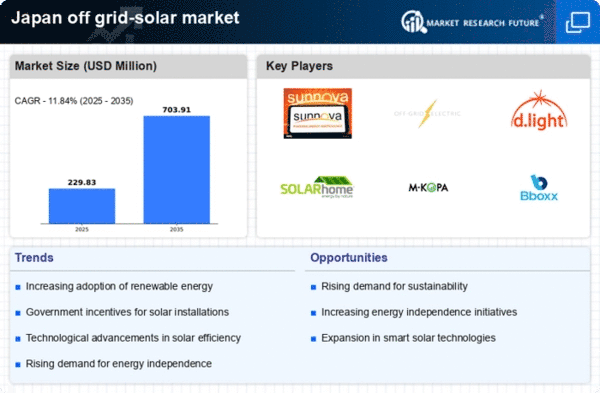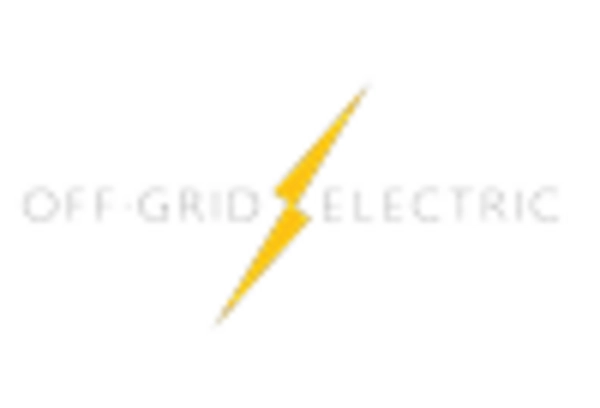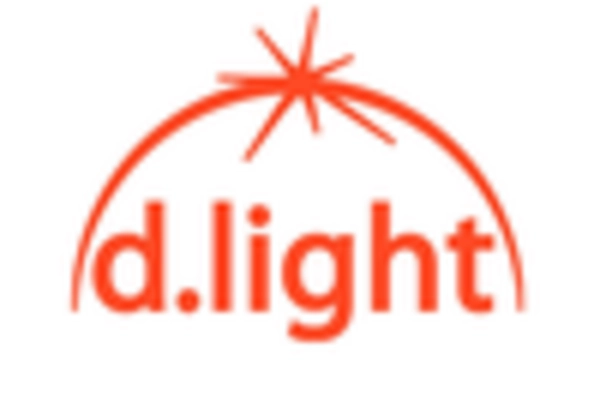Rising Energy Costs
The increasing costs of conventional energy sources in Japan appear to be a significant driver for the off grid-solar market. As fossil fuel prices fluctuate, consumers and businesses are seeking alternative energy solutions to mitigate expenses. In recent years, energy prices have risen by approximately 15%, prompting a shift towards renewable energy sources. The off grid-solar market benefits from this trend, as individuals and organizations look to invest in solar technology to achieve energy independence and reduce reliance on the grid. This shift not only addresses economic concerns but also aligns with Japan's commitment to sustainability and reducing carbon emissions. Consequently, the off grid-solar market is likely to experience growth as more consumers recognize the long-term financial benefits of solar energy systems.
Environmental Awareness
Growing environmental consciousness among the Japanese population is significantly influencing the off grid-solar market. As awareness of climate change and environmental degradation increases, consumers are more inclined to adopt renewable energy solutions. Surveys indicate that approximately 70% of Japanese citizens support the transition to renewable energy sources, reflecting a societal shift towards sustainability. This heightened awareness drives demand for off grid-solar systems, as individuals seek to reduce their carbon footprint and contribute to a greener future. The off grid-solar market stands to benefit from this trend, as more consumers prioritize eco-friendly energy solutions. Furthermore, this societal shift aligns with Japan's national policies aimed at achieving carbon neutrality by 2050, further propelling the growth of the off grid-solar market.
Technological Innovation
Technological advancements in solar energy systems are driving the off grid-solar market in Japan. Innovations such as improved photovoltaic (PV) cells and energy storage solutions have enhanced the efficiency and affordability of solar installations. For instance, the efficiency of solar panels has increased by over 20% in recent years, making them more attractive to consumers. Additionally, the development of smart grid technologies allows for better energy management and integration of solar power into existing systems. These advancements not only lower the initial investment costs but also improve the overall performance of off grid-solar systems. As technology continues to evolve, the off grid-solar market is poised for further expansion, appealing to a broader range of customers seeking reliable and sustainable energy solutions.
Government Policy Support
Supportive government policies are playing a pivotal role in shaping the off grid-solar market in Japan. The government has implemented various initiatives aimed at promoting renewable energy adoption, including subsidies and tax incentives for solar installations. Recent data indicates that government incentives have led to a 30% increase in solar installations over the past year. These policies not only lower the financial barriers for consumers but also encourage investment in the off grid-solar market. As the government continues to prioritize renewable energy in its energy strategy, the off grid-solar market is expected to thrive, attracting both residential and commercial customers seeking sustainable energy solutions.
Decentralized Energy Solutions
The trend towards decentralized energy solutions is emerging as a key driver for the off grid-solar market in Japan. With the increasing frequency of natural disasters, such as earthquakes and typhoons, the need for resilient energy systems has become apparent. Off grid-solar systems provide a reliable alternative, allowing communities to maintain power during grid outages. This resilience is particularly crucial in rural areas, where access to centralized energy infrastructure may be limited. The off grid-solar market is likely to see growth as more consumers and local governments invest in decentralized energy solutions to enhance energy security. This shift not only addresses immediate energy needs but also fosters community empowerment and self-sufficiency in energy production.
















